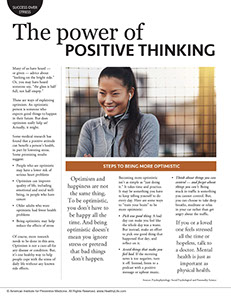SYMPTOM CHECKER
CONDITIONS
Male
Female
Child
Arm, Hand & Shoulder Concerns
Legs & Feet Concerns
Dental & Mouth Concerns
Ear & Nose
Eye Conditions
Head Conditions
Arm, Hand & Shoulder Concerns
Legs & Feet Concerns
Front
Back
Arm, Hand & Shoulder Concerns
Dental & Mouth Concerns
Ear & Nose
Eye Conditions
Head Conditions
Arm, Hand & Shoulder Concerns
Dental & Mouth Concerns
Ear & Nose
Eye Conditions
Head Conditions
Front
Back
Arm, Hand & Shoulder Concerns
Neck Links
Head & Neck Concerns
Arm, Hand & Shoulder Concerns
Neck Links
Head & Neck Concerns
Front
Back
Online Clinic
Wise Healthcare
The power of positive thinking
Print on Demand
Many of us have heard — or given — advice about “looking on the bright side.” Or, you may have heard someone say, “the glass is half full, not half empty.”
These are ways of explaining optimism. An optimistic person is someone who expects good things to happen in their future. But does optimism really help us? Actually, it might.
Some medical research has found that a positive attitude can benefit a person’s health, in part by lowering stress. Some promising results suggest:
• People who are optimistic may have a lower risk of serious heart problems
• Optimism can improve quality of life, including emotional and social well-being, in people who have cancer
• Older adults who were optimistic had fewer health problems
• Being optimistic may help reduce the effects of stress
Of course, more research needs to be done in this area. Optimism is not a cure-all for any disease or condition. But, it’s one healthy way to help people cope with the stress of daily life without any known side effects.
Steps to being more optimistic
Optimism and happiness are not the same thing. To be optimistic, you don’t have to be happy all the time. And being optimistic doesn’t mean you ignore stress or pretend that bad things don’t happen.
Becoming more optimistic isn’t as simple as “just doing it.” It takes time and practice. It may be something you have to keep telling yourself to do every day. Here are some ways to “train your brain” to be more optimistic:
• Pick one good thing. A bad day can make you feel like the whole day was a waste. But instead, make an effort to pick one good thing that happened that day, and reflect on it.
• Avoid things that make you feel bad. If the morning news is too negative, turn it off. Instead, listen to a podcast with a positive message or upbeat music.
• Think about things you can control — and forget about things you can’t. Being stuck in traffic is something you cannot control. But, you can choose to take deep breaths, meditate or relax in your car rather than get angry about the traffic.
If you or a loved one feels stressed all the time or hopeless, talk to a doctor. Mental health is just as important as physical health.
Sources: Psychophysiology; Social Psychological and Personality Science
This website is not meant to substitute for expert medical advice or treatment. Follow your doctor’s or health care provider’s advice if it differs from what is given in this guide.
The American Institute for Preventive Medicine (AIPM) is not responsible for the availability or content of external sites, nor does AIPM endorse them. Also, it is the responsibility of the user to examine the copyright and licensing restrictions of external pages and to secure all necessary permission.
The content on this website is proprietary. You may not modify, copy, reproduce, republish, upload, post, transmit, or distribute, in any manner, the material on the website without the written permission of AIPM.
2021 © American Institute for Preventive Medicine - All Rights Reserved. Disclaimer | www.HealthyLife.com
















































